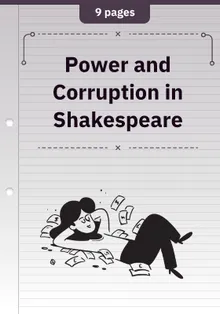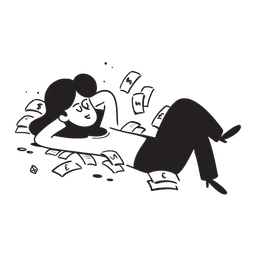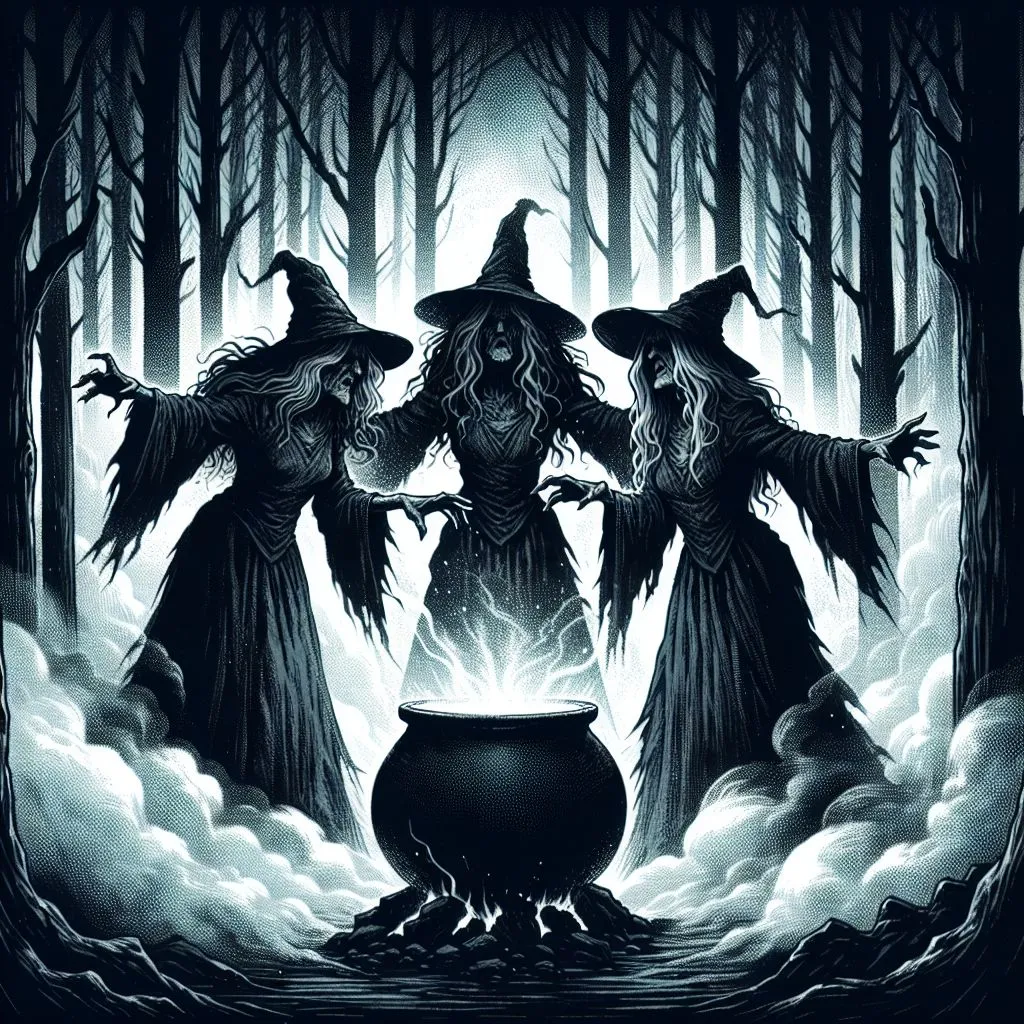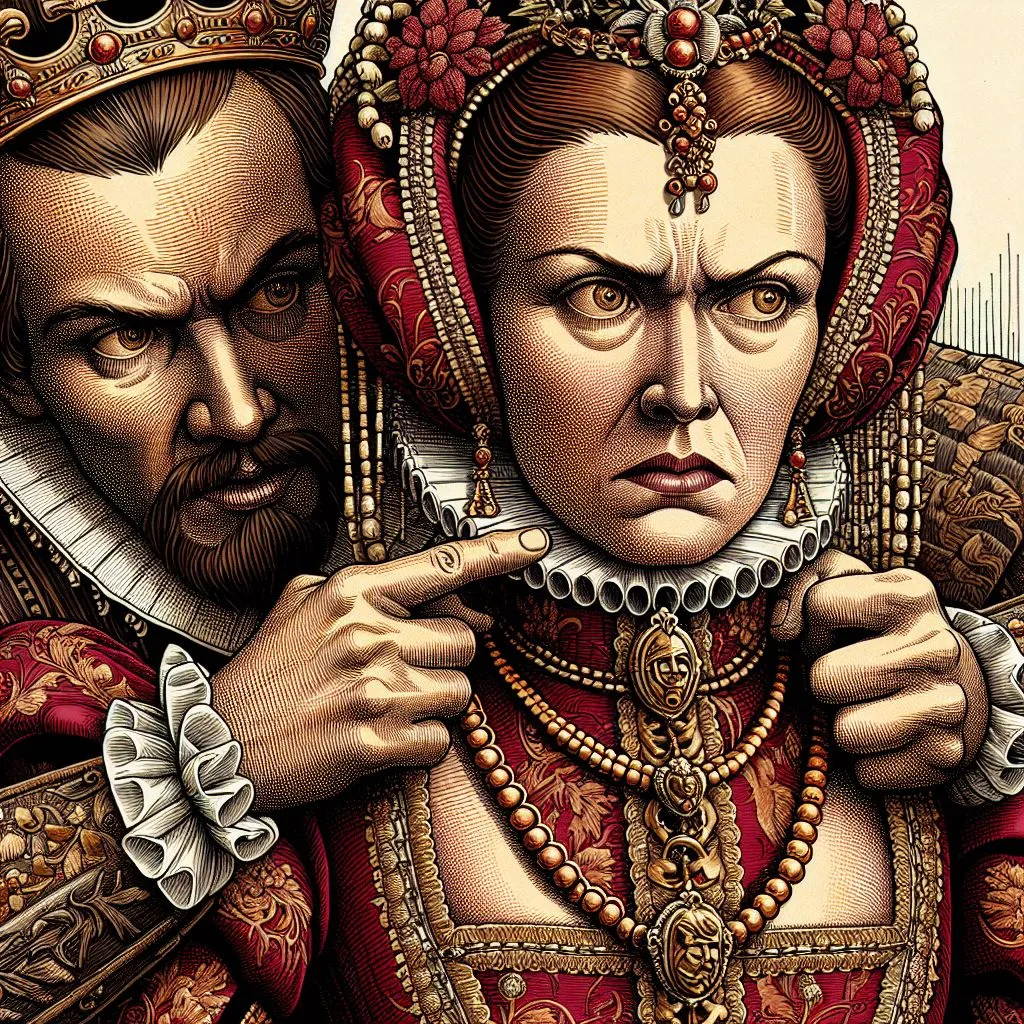
Power and Corruption in Shakespeare
Objective: Define power, reflect on the connection between power and corruption and analyze a Shakespearean character's descent towards corruption.
Content and Methodology: First, power is contextualized, defined and explored on a personal level. Next, it is applied to a Shakespearean play and analyzed based on excerpts. The findings are displayed in a creative exercise and connected to the modern world.
Skills: Critical thinking, text understanding and analysis, writing and transfer
Target Audience and Level: Advanced grade 10 and higher
61 other teachers use this template
Target group and level
Advanced grade 10 and higher
Subjects
Power and Corruption in Shakespeare

Part I: What is power?
Lade Zeichenfeld...
Sample solution for teachers
Alone or in small groups, come up with a definition of the term 'power'.
Describe and analyze the cartoon. Share your thoughts with a partner.

Image by <a href="https://pixabay.com/users/gdj-1086657/?utm_source=link-attribution&utm_medium=referral&utm_campaign=image&utm_content=7297651">Gordon Johnson</a> from <a href="https://pixabay.com//?utm_source=link-attribution&utm_medium=referral&utm_campaign=image&utm_content=7297651">Pixabay</a>
Cartoon
Part II: Power and corruption in Shakespeare
Read the excerpts and complete the assignment.
Excerpt
Act 1, Scene 3: Macbeth hears the witches’ prophecy.
First Witch: All hail, Macbeth! hail to thee, Thane of Glamis!
Second Witch: All hail, Macbeth! hail to thee, Thane of Cawdor!
Third Witch: All hail, Macbeth, that shalt be king hereafter!
Act 1, Scene 7: Macbeth debates killing Duncan.
Macbeth: If it were done when 'tis done, then 'twere well
It were done quickly: if the assassination
Could trammel up the consequence, and catch
With his surcease success; that but this blow
Might be the be-all and the end-all–here,
But here, upon this bank and shoal of time,
We'ld jump the life to come. But in these cases
We still have judgment here; that we but teach
Bloody instructions, which, being taught, return
To plague the inventor: this even-handed justice
Commends the ingredients of our poison'd chalice
To our own lips.
Act 2, Scene 1: Macbeth hallucinates the dagger.
Macbeth: Is this a dagger which I see before me,
The handle toward my hand? Come, let me clutch thee.
I have thee not, and yet I see thee still.
Art thou not, fatal vision, sensible
To feeling as to sight? or art thou but
A dagger of the mind, a false creation,
Proceeding from the heat-oppressed brain?
I see thee yet, in form as palpable
As this which now I draw.
Thou marshall'st me the way that I was going;
And such an instrument I was to use.
Mine eyes are made the fools o' the other senses,
Or else worth all the rest; I see thee still,
And on thy blade and dudgeon gouts of blood,
Which was not so before. There's no such thing:
It is the bloody business which informs
Thus to mine eyes. Now o'er the one halfworld
Nature seems dead, and wicked dreams abuse
The curtain'd sleep; witchcraft celebrates
Pale Hecate's offerings, and wither'd murder,
Alarum'd by his sentinel, the wolf,
Whose howl's his watch, thus with his stealthy pace.
With Tarquin's ravishing strides, towards his design
Moves like a ghost. Thou sure and firm-set earth,
Hear not my steps, which way they walk, for fear
Thy very stones prate of my whereabout,
And take the present horror from the time,
Which now suits with it. Whiles I threat, he lives:
Words to the heat of deeds too cold breath gives.
[A bell rings]
I go, and it is done; the bell invites me.
Hear it not, Duncan; for it is a knell
That summons thee to heaven or to hell.
Act 3, Scene 1: Macbeth decides to kill Banquo.
Macbeth: To be thus is nothing;
But to be safely thus. Our fears in Banquo
Stick deep; and in his royalty of nature
Reigns that which would be fear'd: 'tis much he dares;
And, to that dauntless temper of his mind,
He hath a wisdom that doth guide his valour
To act in safety. There is none but he
Whose being I do fear: and, under him,
My Genius is rebuked; as, it is said,
Mark Antony's was by Caesar. He chid the sisters
When first they put the name of king upon me,
And bade them speak to him: then prophet-like
They hail'd him father to a line of kings:
Upon my head they placed a fruitless crown,
And put a barren sceptre in my gripe,
Thence to be wrench'd with an unlineal hand,
No son of mine succeeding. If't be so,
For Banquo's issue have I filed my mind;
For them the gracious Duncan have I murder'd;
Put rancours in the vessel of my peace
Only for them, and mine eternal jewel
Given to the common enemy of man,
To make them kings, the seed of Banquo kings!
Rather than so, come, Fate, into the list,
And champion me to the utterance!
Who's there?
Act 5, Scene 5: Macbeth’s famous “Tomorrow, and tomorrow, and tomorrow” speech.
Macbeth: She should have died hereafter;
There would have been a time for such a word.
To-morrow, and to-morrow, and to-morrow,
Creeps in this petty pace from day to day
To the last syllable of recorded time,
And all our yesterdays have lighted fools
The way to dusty death. Out, out, brief candle!
Life's but a walking shadow, a poor player
That struts and frets his hour upon the stage
And then is heard no more: it is a tale
Told by an idiot, full of sound and fury,
Signifying nothing.
Part III: Interactive activities
Part IV: Connection to the real world
How does the Shakespearean character compare to today's powerful people?
EXTRA
Debate whether the character is responsible for their own tyranny or if someone else is to blame.
Blame the Witches

Blame Lady Macbeth
